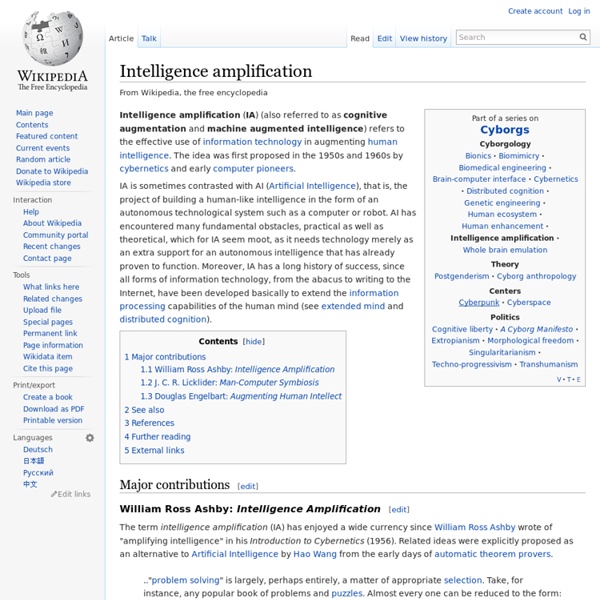Intelligence amplification

Digi face
Recommender system
Recommender systems or recommendation systems (sometimes replacing "system" with a synonym such as platform or engine) are a subclass of information filtering system that seek to predict the 'rating' or 'preference' that user would give to an item.[1][2] Recommender systems have become extremely common in recent years, and are applied in a variety of applications. The most popular ones are probably movies, music, news, books, research articles, search queries, social tags, and products in general. However, there are also recommender systems for experts, jokes, restaurants, financial services, life insurance, persons (online dating), and twitter followers .[3] Overview[edit] The differences between collaborative and content-based filtering can be demonstrated by comparing two popular music recommender systems - Last.fm and Pandora Radio. Each type of system has its own strengths and weaknesses. Recommender system is an active research area in the data mining and machine learning areas.
Automated online assistant
Automated online assistants have the ability to provide customer service during 24 hours a day and 7 days a week, and may, at least, be a complement to customer service by humans.[2] One report estimated that an automated online assistant produced a 30% decrease in the work-load for a human-provided call centre.[3] Usage[edit] Large companies such as Lloyds Banking Group and Royal Bank of Scotland are now using automated online assistants instead of call centres with humans to provide a first point of contact.[citation needed]Also, IKEA has an automated online assistant in their help center.[4] Automated online assistants can also be implemented via Twitter, or Windows Live Messenger, such as, for example, Robocoke for Coca Cola Hungary. Popular online portals like eBay and PayPal are also using multilingual virtual agents to offer online support to their customers. Components[edit] Dialog system[edit] Avatar[edit] Other components[edit] See also[edit] Notes and references[edit]
Collective intelligence
Types of collective intelligence Collective intelligence is shared or group intelligence that emerges from the collaboration, collective efforts, and competition of many individuals and appears in consensus decision making. The term appears in sociobiology, political science and in context of mass peer review and crowdsourcing applications. It may involve consensus, social capital and formalisms such as voting systems, social media and other means of quantifying mass activity. Collective IQ is a measure of collective intelligence, although it is often used interchangeably with the term collective intelligence. Collective intelligence strongly contributes to the shift of knowledge and power from the individual to the collective. History[edit] Dimensions[edit] Howard Bloom has discussed mass behavior—collective behavior from the level of quarks to the level of bacterial, plant, animal, and human societies. Openness Peering Sharing Acting Globally Examples[edit] Mathematical techniques[edit]
Related:
Related:



